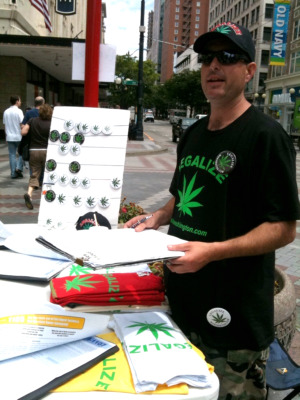[NOTE: The organizers announced on Thursday that they don’t have enough signatures.]
In public comments earlier this month, the sponsor of a measure to legalize marijuana in Washington, I-1068, blasted labor-union giant SEIU for its last-minute decision not to help bankroll his signature-gathering campaign. Without the SEIU’s money, Philip Dawdy lamented, he’d be stuck relying on an all-volunteer squad of signature-gatherers, leaving his bid for a place on the November ballot a long shot.
The initiative process in Washington “is clearly tilted,” he complained, “…in favor of big moneyed interests.”
And as the Friday deadline for submitting signatures approaches, Dawdy is indeed at a disadvantage. Among the many mundane obstacles to going all-volunteer is the Secretary of State’s requirement that petitions be on 11×17 paper, which makes it impossible for most normal people to print out a petition at home, Dawdy notes. Big-money campaigns can also pay professional services to “scrub” their petitions of bad entries (fake names, unregistered voters, etc.) before submitting them to the state, which helps to get the initiative certified more easily.
Yet it’s also true that big-moneyed interests have helped the pot campaign big-time. The SEIU, for example, is paying to put signatures on the marijuana petition—and so are Costco, liquor distributors, and other big players in this year’s initiative game. Just not directly.
To see the subsidy in action, you only had to pay a visit to the two guys whose photo was on the front page of The Seattle Times last week, Mike Raupp and Chad Towe. They’d set up tables on Pine Street downtown and covered them with “Legalize” T-shirts, caps, and buttons. If you stopped by, they were indeed happy to take your signature for I-1068. But they’re not strictly volunteers. They’re itinerant signature-gathering professionals from California who are being paid to push initiatives such as I-1098, which is being heavily backed by SEIU and would put an income tax on the wealthy. But pot serves as a handy lure.
“[Legalization] is the hottest issue in America right now,” Towe told the Weekly. “People are aware of the issue, and then they come over and we can talk to them about other issues as well.”
Another professional signature-gatherer working at Seattle Center recently explained that he brings the pot petition along, even though he’s not being paid for it, because it can be a good way to get people to stop—especially younger people, who might not be so interested in, say, privatizing workers’ comp (I-1082). Pot, in other words, is the gateway petition.
“It makes sense for the paid petitioners to have 1068 with them because it helps them with everything else,” notes Dawdy, a former Seattle Weekly staff writer. “We’ve helped Costco, Tim Eyman, the BIAW, people trying to overturn the candy tax”—all of whom are pushing initiatives this year. “I think even the anti-immigrant group [Respect Washington!, which sponsors I-1056] was using it.”
So while the initiative game may be tilted, it’s also marked by a kind of symbiosis—pot has helped draw an audience for other initiatives, and big-money backers have in turn provided Dawdy’s campaign with free labor.
Raupp and Towe happen to be true believers in the cause, Dawdy says. But as the final signature-gathering days wind down, the problem for his campaign is that without the prospect of payment, some of the other pros with filled-out I-1068 petitions might not have sufficient incentive to turn them in.








